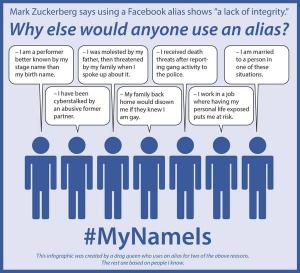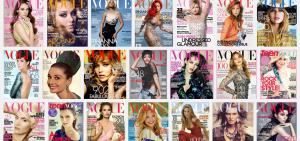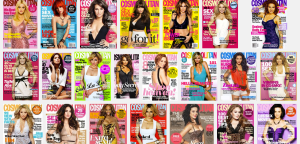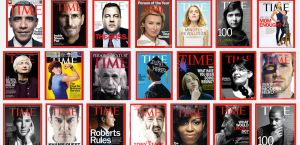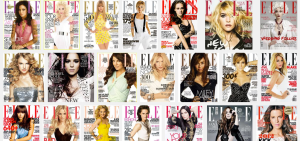Recent news has circulated around Facebook’s enforcement of their policy on using “real” names. Although it may not seem to be directly related to cyber racism and the readings from this week I still see common themes that show how cyber racism is at play in this recent debate. The Guardian reports that recently hundreds of drag queens were informed that their Facebook profiles were going to be deactivated unless they changed their names to be “real” names. In a discussion of authority, white supremacy, and globalization below, I hope to shed some light on the key issues I see with the enforcing of this policy.
Safety in the Internet world
In the same article in the Guardian, Facebook justified their actions by saying that “we’ve seen situations where people have used fake names to engage in bad behavior online”, and the author notes that this “completely misses the point. Seeing ‘situations’ where fake names enable bad behavior isn’t a reason to crack down on pseudonyms. It’s a reason to crack down on bad behavior.” Getting to the root of one problem is better than creating another. The Facebook online policy on “changing your name and birthday” corroborates this statement: “Facebook is a community where people use their real identities. We require everyone to provide their real names, so you always know who you’re connecting with. This helps keep our community safe.” But hate speech online occurs regardless of whether you can be identified by your name or not. In a blog post on NPR a statement from Chris Wolf, national chairman of the Anti-Defamation League’s Civil Rights Committee, tried to justify the real name policy and said: “As someone who has studied online hate for 20 years, I know that a real name policy works to prevent hate speech and harassment. … On balance, the benefits on anonymity for one group needs to be balanced against the potential harm anonymity can cause everyone.” The problem here lies with the anonymity of a name. In this case, people aren’t trying to hide, they are trying to belong. A name is the ultimate signifier of identity, it is how people know you and how you represent yourself to the world. Nicknames and fake names can often be more important signifiers of belonging to certain communities than one’s birth name. The Internet communities of belonging, for example your circle of Facebook friends, are thus regulated and patrolled under the guise of public safety. Where is the regulation of usernames on white supremacist sites that enable hate speech and blogging? Why aren’t those users forced to give their real names, to own up to their speech, and not hide behind the screen of anonymity and a fake username. There was even a discussion in Cyber Racism by Jessie Daniels on how people on these sites choose their usernames, how there are cultural, racial, class, and gendered specificities that go into picking a username that fully represents the individual who registers with the site (Daniels 63). If these people are allowed to have so much freedom and thought go into defining parts of their identity with a name, why aren’t people allowed to use their desired names on Facebook?
Further along the lines of safety, sometimes people may change their Facebook names to protect themselves from an abusive past. Maybe there is someone that they don’t want to find them or know about their life. Changing a name gives the people control of how they represent themselves on the Internet and can give a comfortable level of anonymity that is controlled within a small circle of friends. In the NPR article the author notes that often, “in a violent situation, control over one’s self is taken away. One of the ways to restore it, she says, ‘is really having the freedom of choosing whatever name you want to use, whatever gender you really are and want to be’”. By being told that they are being forced to use “real” names, those who maybe felt once safe are now going to be exposed.
The concept of “real” in general is also very troubling. Who gets to dictate what is a real name? How will this be regulated? In the “Help” section of Facebook they say that “The name you use should be your real name as it would be listed on your credit card, driver’s license or student ID” and a very broad statement proclaims: “Pretending to be anything or anyone isn’t allowed”. This speaks to authenticity and that those who don’t use their real birth names are somehow “pretending” to be something they’re not, that any form of deviation from the norm is not real, it is an act, and should not be taken seriously.
How white supremacy reigns
The white supremacy behind cyber racism is discussed at length in the Jessie Daniels reading. It is the foundation upon which all the tenets of Internet racism and policing rest, and the lens through which established thought comes to be. Just think about who gets the make all the rules, who is designing these sites, who is in leadership positions in the companies that get to make decisions like this one? The authority in charge has the power to put into place the ideals of white supremacy and just acts as a catalyst for maintaining the current power dynamics. The author of the Guardian article notes that, “A ‘real name’ policy is fundamentally an appeal to authority – we outsource the ability to determine “real names” to parents and parent figures in the government. So when Facebook allows users to report “fake names”, it is giving them permission to enforce other people’s identities that they think are not sufficiently ratified by existing government authorities”. The population in power is largely white and male. Laws have been institutionalized to include and privilege certain parties in this world and basically make it practically very hard to live comfortably and be anything but white. Systemic racism uses institutionalized practices to invoke and enforce racist practices. In this case, the regulation of true self proclaimed identity is an attack on personal liberties and is a way of systemically controlling populations.
Furthermore, Facebook is a site for people all over the world and thus enforces the ideals of white supremacy to a global audience. Daniels also notes how white supremacy is not confined to US boundaries although the majority of hate websites do come from American domains (Daniels 45). The “white is right” mentality is insidious and is pervasive in all facets of life around the globe. It is seen covertly in everyday life. In Facebook’s “Community Standards” regulations page they say that, regarding hate speech, “Facebook does not permit hate speech, but distinguishes between serious and humorous speech.” I will not discuss the problems of this statement at length here for the sake of brevity, but again, putting the judging of harmful speech in the hands of outside parties disregards the effects that many covert forms of subtle cyber racism have on large populations of people. Just take a look at popular media. Look at the people that are featured on the covers of magazine and in leading roles on television. We are saturated with images of successful white heteronormativity on the daily (examples below) and thus are told that this way of life is “normal” and “right”. Everything else is some deviation from that and thus subject to regulation to realign with those frameworks.
Gender Dynamics at play
One doesn’t have to look far to see how gender dynamics are affected in this case. First of all we can see how people who may be transitioning, or are drag queens are directly targeted here. Facebook is taking away the liberty for people to say who they really are and to define how they represent themselves to the world. Furthermore, men or women with abusive partners may be searching for a safe haven in the anonymity of names on Facebook and are now going to be forced to reveal themselves to a potentially dangerous partner. If you think about those who are targeted by this new policy we can see how gender roles are also at play. I personally know many high school girls (also mostly white) who change their Facebook names during senior year so that college admissions offices can’t search their names and find pictures of them at some high school party with a beer in their hand or wearing a “slutty nurse” costume from Halloween. These young white girls are not the target of Facebook’s new enforcement of the policy and yet they have more to hide, one could argue, than many people who are.
Racial dynamics at play
Beyond the racial elements already mentioned, we need to really consider what we mean when we say “real” name. This essentially means a “normal white sounding name” and thus reinforces racial divides in another way. There have been many studies done on the effects of job hiring as related to your name on a resume and as mentioned in a New York Times article from 2009, “Research has shown that applicants with black-sounding names get fewer callbacks than those with white-sounding names, even when they have equivalent credentials.” Since whiteness equates to being hired and being more successful, it is no wonder that applicants will try to downplay aspects of their blackness (like going by a different name). The article in the New York Times further notes that, “if playing down blackness is a common strategy born of necessity, perceived or real, it still takes a psychic toll, maybe a greater one now, as people calibrate identity more carefully.” The regulation of Facebook names is just a more institutionalized practice of the self regulating that already sadly happens in many non-white communities. The author of the article further mentioned that, “In some ways, they are denying who and what they are,” he said. “They almost have to pretend themselves away.”
Immigrant and other dynamics at play
The policy is also a very US citizen centric one. First of all, names cannot include characters from other languages thus enforcing English as the universal language and othering anyone else who writes or speaks in anything else. Furthermore, Facebook only accepts certain forms of ID as valid:
- “Birth certificate
- Driver’s license
- Passport
- Marriage certificate
- Official name change paperwork
- Personal or vehicle insurance card
- Non-driver’s government ID (ex: disability, SNAP card, national ID card)
- Green card, residence permit or immigration papers
- Voter ID card”
The nature of having many of these IDs is specific to being an American citizen and often the tests, fees, and overall process of acquiring these forms of ID also reflect institutionalized practices that are meant to privilege white Americans and shut out or make life difficult for anyone who threatens the status quo.
If we want Facebook to be a truly free space for people to express themselves, connect with friends, and ultimately feel safe, then having a “fake” name is in no way threatening this. More often than not the names that are used are more “real” to the user than their birth name anyway. It’s all about really thinking about who has the authority to regulate in these situations, who are the victims, and how those power dynamics speak to larger discrepancies in gender and race relations.
Sources:
“What Names Are Allowed on Facebook? | Facebook Help Center | Facebook.” What Names Are Allowed on Facebook? | Facebook Help Center | Facebook. N.p., n.d. Web. 29 Sept. 2014.
Farrington, Dana. “Facebook Requires Real Names. What Does That Mean For Drag Queens?” NPR. NPR, 28 Sept. 2014. Web. 28 Sept. 2014.
“What Types of ID Does Facebook Accept? | Facebook Help Center | Facebook.” What Types of ID Does Facebook Accept? | Facebook Help Center | Facebook. N.p., n.d. Web. 29 Sept. 2014.
“Facebook Community Standards.” Facebook. N.p., n.d. Web. 28 Sept. 2014.
Luo, Michael. “‘Whitening’ the Résumé.” Www.nytimes.com. The New York Times, 5 Dec. 2009. Web. 28 Sept. 2014.
“https://pbs.twimg.com/media/ByL-frtCYAA_ebH.jpg”. 2014. JPEG file.
Screen shots of google searches. 2014. JPEG file.
Zimmerman, Jess. “Facebook’s Real Name Policy Is a Drag, and Not Just for the Performers It Outs.” Www.theguardian.com. The Guardian, 24 Sept. 2014. Web.

